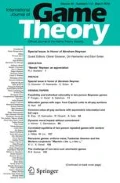Abstract
The notion of automorphism is an essential tool to capture the meaning of any mathematical structure. We apply this idea to cooperative games and obtain two interesting characterizations of the automorphisms of such a game: the one, in the complete case, as the permutations of players which preserve the (classical) Shapley value; the other, for the general case, as the permutations preservingall weighted Shapley values.
Similar content being viewed by others
References
Carreras F (1984) A characterization of the Shapley-Shubik index of power via automorphisms. Stochastica 8: 171–179
Carreras F, Owen G (1993) Separation of games by weighted values. Unpublished manuscript
Isbell JR (1956) A class of majority games. Quarterly Journal of Math 2nd series 7: 183–187
Kalai E, Samet D (1987) On weighted shapley values. Int J of Game Theory 16: 205–222
Shapley LS (1953) A values forn-person games. In: Kuhn HW, Tucker AW (eds) Contributions to the theory of games II. Annals of Math Studies 28: 307–317
Author information
Authors and Affiliations
Additional information
Carreras' research supported by project UPV 036321-HA186/92 of the Basque Country University. Owen's research supported by the National Science Foundation, Grant DMS-9116416. This collaboration was made possible by the Polytechnic University of Catalonia, which sponsored Owen's visit to Terrassa.
Rights and permissions
About this article
Cite this article
Carreras, F., Owen, G. Automorphisms and weighted values. Int J Game Theory 26, 1–10 (1997). https://doi.org/10.1007/BF01262508
Received:
Revised:
Issue Date:
DOI: https://doi.org/10.1007/BF01262508




